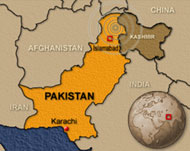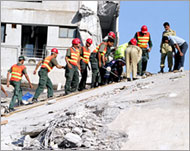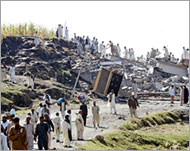Quake survivors angry over aid delay
Earthquake relief has started to trickle into the hardest hit areas of northern Pakistan, but survivors say it has been slow in coming.

Residents and survivors in the Pakistan-administered Kashmiri town of Balakot, are angry at what they say is their government’s slow response, Aljazeera’s Ahmed Barakat reported from the devastated town, 180km north of Islamabad.
Striking out from the forest-clad mountains of Pakistani Kashmir near the border with India, the quake was the strongest to hit South Asia in a century.
Vast areas in Pakistani Kashmir were devastated and entire villages in northern Pakistan were wiped out, the local authorities said.
Pakistani army spokesman Major-General Shaukat Sultan said: “The earthquake is the biggest disaster in the history of Pakistan.
“There are many villages that have been wiped off the face of this earth.”
Questions
Relief had not reached many of the stricken areas because of heavy rains and landslides triggered by the earthquake.
 |
|
The massive earthquake was |
Roads and routes had been wiped out and the communications infrastructure had also been badly damaged, Sultan said.
By mid-afternoon, the Pakistani Red Crescent had arrived to set up a field clinic for the survivors.
Heavy drilling and retrieval equipment were en route to the devastated town, but the earthquake’s effects on roads hampered and slowed down their arrival.
Earlier, many survivors in Balakot and the immediate vicinity said they were angry the central government had focused its relief efforts on the capital.
Lost children
“If the government has devoted its efforts to rescue a few hundred people stuck under the rubble of one building in Islamabad, why has it then completely ignored this badly afflicted area where tens of thousands of people have been killed and injured?” one unidentified survivor told Aljazeera.
Barakat reported seeing children gathered in the streets of one section of the town, apparently separated from their families whose whereabouts were still unknown.
|
“If the government has devoted its efforts to rescue a few hundred people stuck under the rubble of one building in Islamabad, why has it then completely ignored this badly afflicted area where tens of thousands of people have been killed and injured?” |
They had been without food and water for many hours.
Survivors assisting in relief efforts were also seen pulling bodies out from under the rubble of collapsed homes using whatever tools they could muster.
Some of the dead bodies littering the streets had already started to decompose, which in the heat could worsen the already desperate situation.
Desperate cries for help could be heard coming from people trapped under the rubble while helicopters were seen hovering over the area for a short while, then disappearing.
Pakistan’s privately owned Geo TV said a military hospital in the small mountain city had been destroyed and injured people were lying in the courtyard of the one working hospital waiting for attention from doctors struggling to cope.
Angry crowds
Shortly before government relief started to trickle into the town, anger peaked when a group of people attacked the Aljazeera television crew thinking they were from a government news agency.
Survivors keep asking: “Where are the government and relief agencies?”
There are more than 140,000 relief organisations in Pakistan, but no one seems to know the extent of the damage in this area, which seems to be the hardest hit.
Only two ambulances of the Islamic Jamaa (Islamic Group) and three others from another organisation have been seen in this area.
These five non-governmental, private, ambulances are the only ones that were seen assisting in rescue efforts.
Bad weather conditions
There were also reports that the army faced difficulty reaching stricken villages and towns in the north of the country due to the closure of roads.
 |
|
Pakistani rescue workers search |
The mayor of Balakot called on the government to immediately intervene, fearing the spread of disease due to poor weather and a lack of medicine and food.
The US Geological Survey said the tremor occurred at a depth of 10km. It struck about 95km northeast of Islamabad and was felt across the subcontinent, shaking buildings in the Afghan, Pakistani, Indian and Bangladeshi capitals.
The first quake was followed over the next 18 hours by more than 20 aftershocks with magnitudes of between 4.5 and 6.3.
Thousands of people in northern Pakistan slept in the open while residents of the capital Islamabad were kept on edge through the night by tremors.
Schools crushed
In another part of the country 400 children were killed at two schools in Pakistan’s North West Frontier Province.
A military spokesman said 215 Pakistani soldiers were killed in the hardest-hit areas.
 |
|
Rescuers search for the bodies |
Ghulam Rashool, an official at the Pakistan Meteorological Department, said it was the strongest earthquake in South Asia since the 1905 Kangra earthquake that killed 20,000 people in India’s Madhya Pradesh state.
Half of the Indian deaths were in Uri, the last big town on he road connecting the two sides of the violence-scarred region. The dead included 15 soldiers, some in bunkers close to a military ceasefire line.
Landslides blocked the 300km road that connects Srinagar, the summer capital of Indian-administered Kashmir, to the rest of India to the south.
The Srinagar-Muzaffarabad road linking Indian and Pakistani Kashmir, reopened to traffic this year for the first time in nearly 60 years, was also blocked.